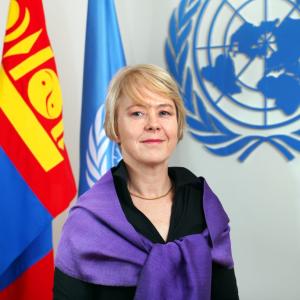Honourable Minister of Health, D. Sarangerel
WHO Resident Representative, Dr. Sergey Diorditsa,
Colleagues, ladies and gentlemen,
Happy World Health Day to you all, and to every Mongolian, old and young, men and women, in cities and the countryside!
It is indeed a World Health Day for everyone! Because this year’s theme is close to everyone’s heart: “Achieving Universal Health Care through strengthening Primary Health Care.”
Primary Health Care, or PHC, is the service point in the health care system that is closest to the people. It is the most immediate care a community has. PHC is everyone’s entry point to their local doctor, or clinic, for advice or treatment. It’s the first stop when one gets sick, or tries to stay healthy. And I cannot stress the importance of this enough.
· PHC is where pregnant mothers, for instance, turn for ante-natal check-ups.
· It’s where children go for life-saving vaccinations.
· It’s where the elderly have their blood pressure measured and hypertension controlled.
· PHC has enabled Mongolia’s “Healthy Liver” National Programme that offers free hepatitis testing.
· It’s where all vital health checks are made. And where referrals for further care are given, if needed.
In short, PHC is how the health sector makes sure that no one is left behind – that anyone can receive quality, affordable health care – wherever, whenever.
And that, ladies and gentlemen, is crucial to ensuring an inclusive society, free from poverty, by 2030, under the Sustainable Development Goals, and Mongolia’s Sustainable Vision. It’s also where progress towards SDG 3 – Good Health and Wellbeing for All – begins.
But while primary health care in Mongolia has come a long way – it also, as in many countries – faces serious challenges. Namely: a lack of human and financial resources.
A shortage of those critical primary health care and prevention resources is, for example, partly why non-communicable diseases like cancer and stroke are the leading causes of death in Mongolia. And why one in five Mongolians dies as a result of heart disease.
To address these risks – and ensure clinics and doctors have the help they need to help others – the UN, and ADB, have come together to support the Mongolian Government in enhancing the targeting of scarce public resources towards PHC for a stronger health sector. Together, we’ve developed a methodology that informs decision making on public investments by the impact they make on advancing the SDGs. Because – as our joint review on SDG Mainstreaming and Acceleration found – policy priorities enshrined in Mongolia’s SDV and the SDGs are currently not sufficiently reflected in budget plans and allocations, which are fundamental to achieving them.
Two ministries – the Ministry of Health, and Ministry of Finance – pioneered this initiative together, to ensure more and better targeted money for primary health care. They worked in tandem, to prioritize health sector funds, using new criteria and checks for SDG-based budgeting and spending.
The pilot was Mongolia’s first SDGs-informed budget, and – I am pleased to say – will continue in 2019, for the 2020 heath budget and also expand our efforts to the environment sector. We hope that in the future these efforts will lead to more effective and impactful financing for primary health and other key SDG goals and targets.
No country can measure progress towards the SDGs, and make necessary modifications, without a well-established Monitoring and Evaluation system. So, the UN is also supporting the Government, by building new SDGs dashboards.
We look forward to hearing about the results of the monitoring of this first pilot on the SDGs-based health sector budgeting, to replicate what works, and address what does not in key areas such as health, the environment and beyond.
I fully believe this will show us how to reach everyone – especially those most in need – with the health services they deserve, to live to their fullest potential. Because only with a healthy population, can we realise a healthy society, economy and planet.
Thank you!





